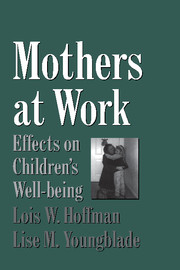Book contents
- Frontmatter
- Contents
- Preface
- 1 Introduction and Review of the Literature
- 2 Methodology
- 3 Children's Daily Family Lives: The After-School Day Interview
- 4 The Husband–Wife Relationship
- 5 The Mother's Well-being
- 6 Childrearing
- 7 Maternal Employment and Child Outcomes: The Direct Relationships
- 8 The Father's Role, Gender Attitudes, and Academic Outcomes
- 9 The Mother's Well-being and Child Outcomes
- 10 Childrearing Patterns and Child Outcomes
- 11 Nonmaternal Care and Supervision: Prevalence and Effects of Child-care Arrangements on Child Well-being
- 12 Summary and Overview
- Appendix: Measures Developed for This Study
- References
- Author Index
- Subject Index
7 - Maternal Employment and Child Outcomes: The Direct Relationships
Published online by Cambridge University Press: 06 July 2010
- Frontmatter
- Contents
- Preface
- 1 Introduction and Review of the Literature
- 2 Methodology
- 3 Children's Daily Family Lives: The After-School Day Interview
- 4 The Husband–Wife Relationship
- 5 The Mother's Well-being
- 6 Childrearing
- 7 Maternal Employment and Child Outcomes: The Direct Relationships
- 8 The Father's Role, Gender Attitudes, and Academic Outcomes
- 9 The Mother's Well-being and Child Outcomes
- 10 Childrearing Patterns and Child Outcomes
- 11 Nonmaternal Care and Supervision: Prevalence and Effects of Child-care Arrangements on Child Well-being
- 12 Summary and Overview
- Appendix: Measures Developed for This Study
- References
- Author Index
- Subject Index
Summary
In this chapter, we turn our focus to an examination of the links between maternal employment patterns and child outcomes. As discussed in Chapter 1, previous research has demonstrated a few consistent differences between children of employed and nonemployed mothers. Daughters of employed mothers indicated greater academic achievements than daughters of non-employed mothers; likewise, children in poverty have been shown to report higher academic achievement in employed-mother families. For middleclass boys, however, the findings have been more mixed, with some studies reporting that sons of employed mothers have lower academic achievement than sons of nonemployed mothers. When socioemotional development is examined, daughters of employed mothers appear more independent and better adjusted than daughters of nonemployed mothers. For boys, however, these patterns have not been found. Overall, both sons and daughters of employed mothers report less adherence to traditional sex-role ideologies.
In this chapter, we examine the direct relationships between the mother's employment status and child outcomes. Children with full-time employed mothers, part-time employed mothers, and nonemployed mothers are compared on several measures of cognitive and socioemotional functioning. Measures of cognitive and socioemotional functioning include peer reports of liking and behavioral characteristics; teacher reports of cognitive and social skills; child self-reports of perceived self-competence, locus of control, and adherence to sex-role stereotypical beliefs; and scores on standardized achievement tests. In these analyses, attention is given to gender, social class, ethnicity, and marital status.
- Type
- Chapter
- Information
- Mothers at WorkEffects on Children's Well-Being, pp. 152 - 173Publisher: Cambridge University PressPrint publication year: 1999

